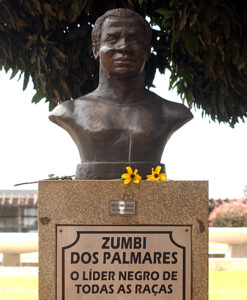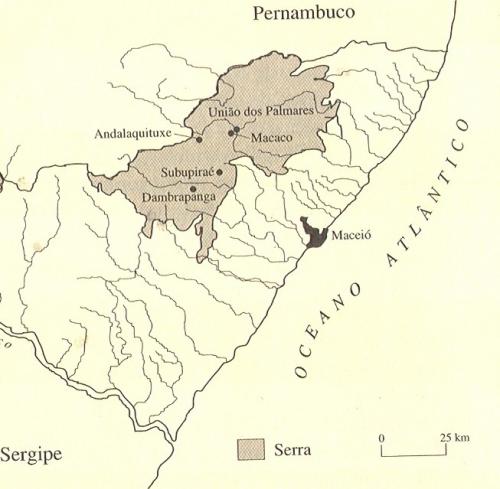Palmares, or Quilombo dos Palmares, was a settlement of fugitive slaves established gradually from the early 1600s to 1694, about 60k inland from the northeast coast of Brazil around the regions of Pernambuco and Alagoas. Estimates indicated that 10,000 to 20,000 fugitive slaves, native Brazilians, and various outcast groups (such as Jews and Muslims) inhabited Palmares throughout the period.
Portuguese colonization, particularly from 1570, brought sugar cane plantations to the northeast coast of Brazil, utilizing, as labor, enslaved Africans and native peoples. Some of the slaves and native Americans resisted and established small settlements or quilombos in the area of Pernambuco, where palm trees abounded (thus the name Palmares).
Illustrative of its complexity, Quilombo dos Palmares in 1640 was described as comprising several separate settlements which pledged their loyalty to one leader (chief). Two of the settlements were mostly of Amerindian origin (Subupira e Tabocas); one of the Portuguese colonists who joined the quilombo (Amaro), and seven Bantos, that is, settlements of fugitive slaves (Andalaquituche, Macaco, Aqualtene, Ambrabanga, Tabocas, Zumbi, Arotiene). With its capital in Macaco, Palmares possessed a complex social structure, replicating, in many instances, African political systems.
When the Portuguese lost control of the region to the Dutch in the 1630s, the new colonial rulers continued the military campaign of the earlier Portuguese to bring Palmares under control. They were no more successful than their predecessors, and the quilombo continued to grow. In 1654, when Portugal regained control of the area, it resumed its attempts to conquer Palmares.

Portuguese military forces and mill owners in the region attempted to regain control over the quilombo for the next forty years. Ganga-Zumba, the Palmares chief during the latter part of this period, tried to negotiate an agreement with the Portuguese where the quilombo would no longer accept fugitive slaves or fight the Portuguese in exchange for permanent recognition of their land and freedom for those born in Palmares. However, Zumbi, the settlement’s military leader, chose resistance to the Portuguese. The Portuguese never accepted Ganga-Zumbi’s proposal and continued to attack the quilombo. Finally, in 1694, Palmares was conquered and destroyed by a military force under the command of Domingos Jorge Velho. Zumbi was killed one year later in 1695.
Palmares was a multifaceted quasi-state that lasted for most of the 17th Century, resisting attack by two European powers. Known for challenging Dutch and Portuguese sovereignty in Brazil, Palmares was a symbol of resistance to colonialism and the possibility of multicultural coexistence.

